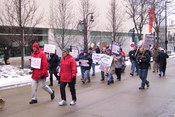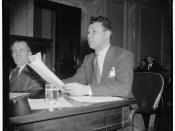Parties: Anthony Brown, et al (appellee) v. Pro Football, inc., et al (appellant)
Facts: In 1987,a collective bargaining agreement between the National Football League, a group of football clubs, and the NFL Players Association, a labor union, expired. The NFL and the Players Association began to negotiate a new contract. In March 1989, during the negotiations, the NFL a plan that would permit each club to establish a "developmental squad" of up to six rookie or "first year" players who, as free agents, had failed to secure a position on a regular player the NFL presented the developmental squad plan to the Players Association. The NFL proposed a squad player salary of $1,000 per week. The Players Association disagreed. It insisted that the club owners give developmental squad players benefits and protections similar to those provided regular players, and that they leave individual squad members free to negotiate their own salaries.
The players said the NFL violated Sherman anti-trust rules and won $30 million dollars. The NFL appealed.
History: In May of 1990, 235 developmental squad players brought an anti-trust suit against the NFL, claiming that the NFL's agreement to pay them a fixed weekly salary violated the Sherman Anti-Trust Act. The Federal District Court denied the NFL's claim of exemption and a jury entered judgment in favor of the players in the treble damages amount of over $30 million dollars. The NFL and its member clubs appealed, and the Court of Appeals reversed the decision, holding that the NFL and member club owners were immune from anti-trust liability.
Issue(s): Are several employers immune from a union anti-trust suit when these employers, bargaining together, impose terms on the union if the collective bargaining process reaches an impasse?
Rule(s) of Law: Sherman Antitrust law states that " any contract,


